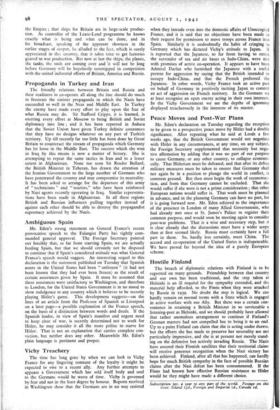Peace Moves and Post-War Plans
Mr. Eden's declaration on Tuesday regarding the reception to be given to a prospective peace move by Hitler had a double significance. After repeating what he said at Leeds a few weeks ago, that the British Government would not negotiate with Hitler in any circumstances, at any time, on any subject, the Foreign Secretary supplemented that necessity but nega- tive affirmation by adding that it was no part of our purpose to cause Germany, or any other country, to collapse economi- cally. That Hitlerism must be defeated, and that after its defeat military measures must be taken to ensure that Germany shall not again be in a position to plunge the world in conflict, is common ground. But then must begin the work of reconstruc- tion, and from that Germany cannot be excluded. That she would suffer if she were is not a prime consideration ; that other European nations would suffer is. That work must be planned in advance, and in the planning Germany can have no part, for it is going forward now. Mr. Eden referred to the importance of the presence in London of many Allied Governments, who had already met once at St. James's Palace to register their common purpose, and would soon be meeting again to consider post-war problems. That is a wise and necessary step, but it is clear already that the discussions must have a wider scope than at first seemed likely. Russia must certainly have a full part in them. So, hardly less certainly, must China. The accord and co-operation of the United States is indispensable. We have passed far beyond the idea of a purely European scheme.


























 Previous page
Previous page